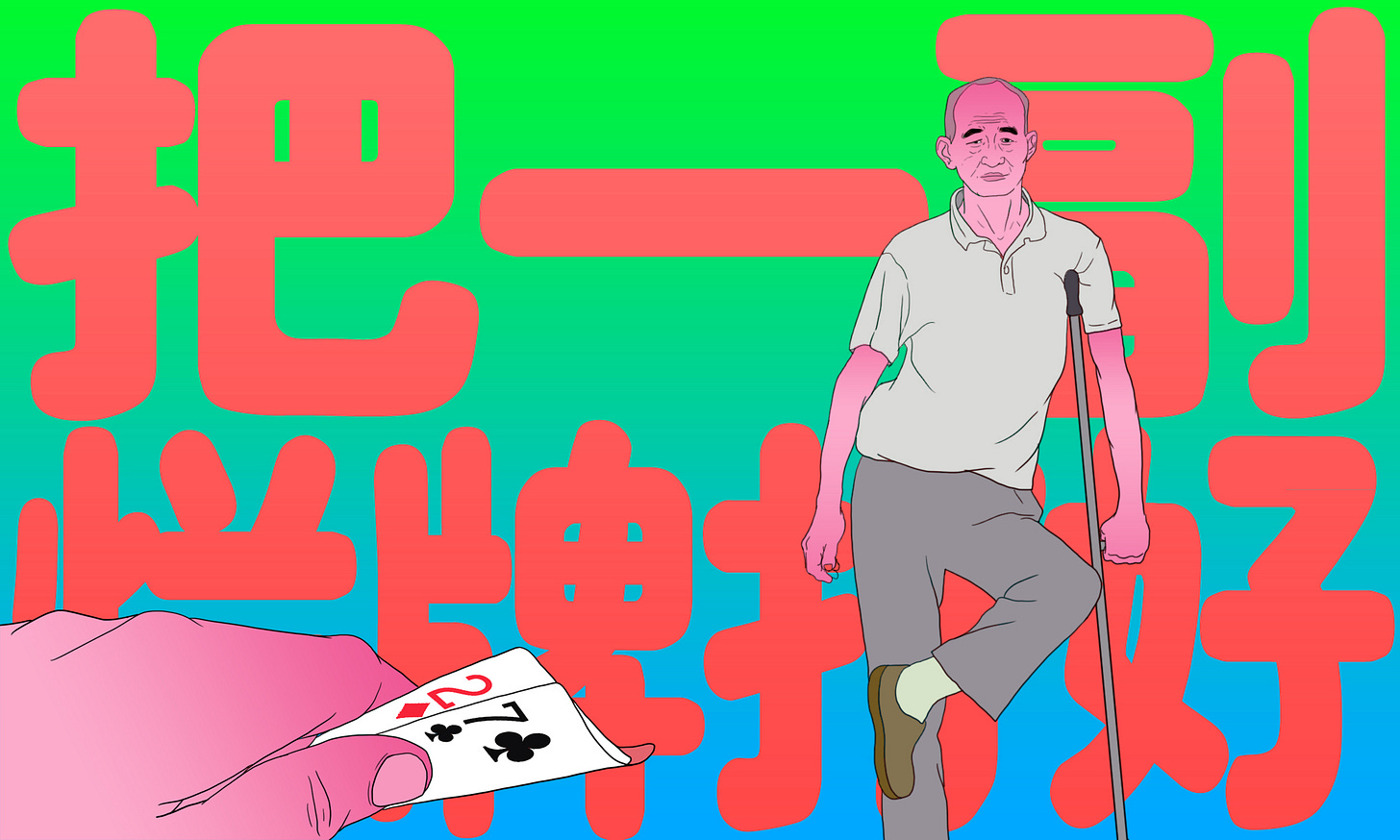Welcome to RealTime Mandarin—a multimedia resource to immerse you in the latest Chinese language trends, inspire you to practice and improve your Mandarin every week, and empower you to communicate with confidence.
Subscribe now to get the next issue straight to your inbox!
Two obscure Chinese words filled Wechat moments, Weibo feeds, and Chinese media news alerts this week:
窜访 cuàn fǎng - ‘rogue visit’
二舅 èr jiù - ‘second uncle’
If you’ve still not had enough Taiwan coverage / noise, and you’re thirsty for a couple of classical but bloody Chinese idioms from Beijing about the ‘rogue visit’, then you can read my Phrase of the Week column in SupChina.
‘Second uncle’ 二舅 èr jiù actually translates as ‘second youngest brother of my mother’ in Chinese.
He is the star of a short film by Chinese vlogger Yige Caixiang (衣戈猜想 yī gē cāi xiǎng) posted on Bilibili (哔哩哔哩) which went viral generating more than 10 million views on the platform.
The 10-minute film is a portrait of Yige’s resilient and resourceful uncle, his 二舅 èr jiù:
My uncle cured my internal anxieties 二舅治好了我的精神内耗 èr jiù zhì hǎole wǒ de jīngshén nèihào (Sina link to full text, see links section below for video link).
Yige tells us his uncle has been disabled his entire adult life due to a medical accident when he was a teenager.
And yet, we learn his 二舅 èr jiù has managed to have a successful career as a carpenter and cabinet maker having taught himself, adopt and raise a daughter, buy her a house, have an unexplained affair with a lady in the neighbouring village while supporting her family financially (including her husband) before they both died suddenly, cared for the vlogger’s grandmother who has recently fallen ill and become depressed, as well as being the person everyone calls on in his village when there’s something to fix.
The popularity of the film has been the topic of much discussion online. It’s simple production quality, the humorous narration of such a tragic story, that èr jiù doesn’t speak throughout, are all cited as reasons why it’s struck a chord.
But according the firm’s creator Yige, it’s because he’s telling a story of success against all odds in a way that so many can relate to:
People say that life is not about playing a good hand well, but about playing a really bad hand well. Put simply, my uncle worked so hard, what reason do I have not to work as hard?
都说人生最重要的,不是胡一把好牌,而是打好一把烂牌。 简单概括就是,二舅都这样了还那么努力,我们有什么资格不努力?
There has also been online commentary that the story is a fake.
But the tale of 二舅 èr jiù is great content for learning Chinese through an authentic and human story of modern China.
So that’s what we’ll learn about this week!
Favourite Five
1. 精神内耗 jīng shén nèi hào
anxious state of mind
许多网友在看完视频之后表示,自己的精神内耗被二舅治好了 - Many netizens after watching the video, felt much better about their own problems thanks to èr jiù‘s story.
2. 井里观天 jǐng lǐ guān tiān
looking at the sky from the bottom of a well
第二年二舅扔掉了手册从床上爬了下来,呆坐在天井里观天,像一只大号的青蛙 - After a year, my uncle decided to put the booklet down and get out of bed. He was like a huge frog at the bottom of a well looking at the sky.
Related: idioms with similar meaning and usage are 井底之蛙 jǐng dǐ zhī wā (a frog at the bottom of a well), and 坐井观天 zuò jǐng guān tiān (sitting in a well looking a the sky).
3. 生老病死 shēng lǎo bìng sǐ
birth, ageing, illness and death
中国人老说“生老病死”,生死之间何苦还要再隔上个“老病”呢?As the Chinese always say, there is only ‘birth, ageing, illness and death’. Why add the suffering of ‘ageing and illness’ to a life that is going to end in death?
Note: a Buddhist saying/idiom and refers to the four rites of passage in life.
4. 久病成医 jiǔ bìng chéng yī
prolonged illness makes a doctor of a patient
但二舅的腿不是伤了,而是废了,所以久病并不能成医 - But my uncle’s leg wasn’t injured, it was crippled. He was unable to treat it even after a prolonged period.
5. 把一副烂牌打好 bǎ yī fù làn pái dǎ hǎo
play a bad hand really well
都说人生最重要的,不是胡一把好牌,而是打好一把烂牌 - People say that life is not about playing a good hand well, but about playing a really bad hand well.
Note: this is a reference to Mahjong 麻将. hú 胡 which is normally written as 和 (but pronounced hú in this context) means to have a full house.
Consuming the conversation
Useful words
混 hùn
drift along; to live
二舅作为军人家属住进了部队,没想到居然混得风生水起 - My uncle, as a family member of someone in the army, was able to move into the residential compound of the armed forces. You would never think that he would have done so well there.
挣扎 zhēng zhá
struggle through
二舅不是也经历了三年的自我矛盾,才选择不挣扎了,继续活下去吗 - Has my uncle not also gone through 3 years of difficulties before finally deciding to stop the struggle and choosing to live his life?
陨落 yǔn luò
fall
二舅的故事到底是天才的陨落,还是普通乡村男人庄敬自强的一生 - Is my uncle’s story about the fall of a genius, or the indomitable spirit of an average man from the countryside?
豁达 huò dá
open-minded
靠着自己的乐观和豁达笑对人生的66岁老头 - A positive open-minded 66-year-old who can laugh at his own life.
解药 jiě yào
relief
在当下的大环境中,年轻人急需一款精神解药,能够用以对抗沮丧和不安 - Nowadays, young people need something as a spiritual relief against frustration and anxiety.
怜悯 lián mǐn
mercy, taking pity
这可不是上天的不仁,而是怜悯 - This is not fate being heartless, but taking pity on him.
Three-character phrases
仙人跳 xiān rén tiào
honey trap















